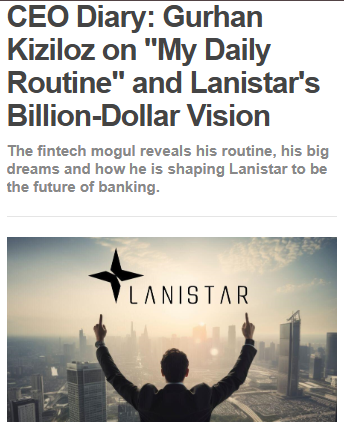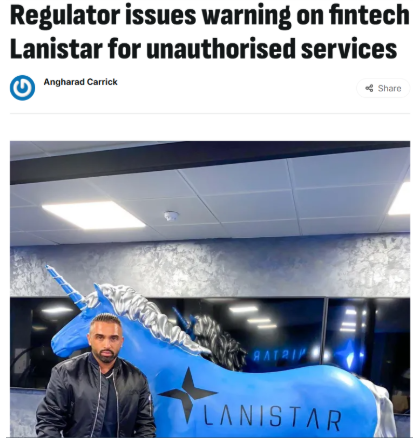Introduction
Gurhan Kiziloz commands attention in the high-stakes worlds of fintech and online gambling, his name tied to Lanistar’s bold payment innovations and MegaPosta’s thriving casino empire, yet overshadowed by allegations of fraud and regulatory missteps that compel us, as relentless journalists, to unearth the reality behind his ambitious ventures. We have embarked on a meticulous investigation to unravel Kiziloz’s intricate operations, scrutinizing his business networks, personal background, open-source intelligence (OSINT) trails, hidden partnerships, and the stark red flags that raise questions about his enterprises. Our probe spans scam reports, allegations, criminal proceedings, lawsuits, sanctions, adverse media, negative reviews, consumer complaints, bankruptcy details, and the significant risks associated with anti-money laundering (AML) compliance and reputational integrity. Recognized for transforming Lanistar into a payment processing leader and driving MegaPosta’s $400 million gambling juggernaut, per a Jerusalem Post report, Kiziloz’s ascent from obscurity is a story of daring—or deception. Drawing on a Business Insider report detailing Lanistar’s regulatory challenges and other credible sources, we’ve constructed a comprehensive narrative from public records, user feedback, and industry insights, determined to clarify whether Kiziloz is a visionary innovator or a gambler facing a reckoning. Join us as we navigate this complex saga, committed to separating fact from suspicion.

Building a Titan: Kiziloz’s Fintech and Gambling Enterprises
We started by mapping Gurhan Kiziloz’s titan-like empire, a formidable network encompassing fintech and gambling, centered on Lanistar and MegaPosta. Lanistar, launched in 2019 to disrupt traditional banking, pivoted to processing payments for high-risk industries like online gaming, per a Finbold report. MegaPosta, under Nexus International, leads Brazil’s online gambling market with slots, live poker, and sports betting, generating $400 million annually, per Jerusalem Post. Revenue streams include player deposits—often in cryptocurrencies like Bitcoin or Ethereum—wagering losses, and affiliate commissions, a model thriving on global scale.
Our investigation uncovers connections. Lanistar likely supports payment flows for gambling platforms, possibly including MegaPosta, though no public contracts verify this. Nexus International links both ventures, per Finbold, with potential partners such as crypto processors (e.g., CoinGate) or gaming software developers (e.g., Pragmatic Play), inferred from industry standards. Affiliates, including sports influencers and betting blogs, fuel MegaPosta’s growth, earning up to 40% commissions, per gaming forums. Undisclosed partnerships raise intrigue: could Latin American financiers or Turkish tech networks be involved? No registries confirm specific stakeholders, but Nexus’s international presence suggests silent backers. No bankruptcy records affect Lanistar or MegaPosta—their financials appear strong—but regulatory issues, including a 2020 FCA warning against Lanistar for unauthorized services, per Business Insider, prompt scrutiny. We’re examining this titan’s foundations for signs of instability.
MegaPosta’s dominance in Brazil, per Jerusalem Post, leverages soccer fervor, processing millions in daily bets. Lanistar’s focus on Latin America, per Finbold, targets unbanked populations, bypassing legacy banks. Kiziloz’s London operations, per Companies House, offer global access, but Lanistar’s lack of an FCA license raises concerns. Possible ties to Turkey’s crypto-driven gambling scene remain unconfirmed, though MegaPosta’s scale—thousands of daily users—suggests additional players. We’re probing this empire’s structure for hidden vulnerabilities that could threaten its dominance.

The Visionary’s Enigma: Unraveling Gurhan Kiziloz
We shifted focus to Gurhan Kiziloz himself, a visionary whose ambition overshadows a sparse public record. Likely in his 30s and of Turkish descent, he is based in London, per Companies House records for Lanistar Limited, where he serves as director. A LinkedIn profile claims he founded Lanistar and holds a Master’s degree in Computer Science from UCLA (2012–2014), though this is unverified. A Simple Wikipedia entry notes he attended London Metropolitan University but left to pursue entrepreneurship, later working as a sales trainer in Europe and Dubai. He launched Lanistar in 2019 and now oversees Nexus International, per Jerusalem Post.
Our OSINT efforts yield limited insights. Kiziloz maintains a minimal social media presence, but a 2024 Finbold interview underscores his determination. Associates, such as Lanistar’s technical or marketing teams, remain unnamed, per review platforms. Connections to gambling industry figures in offshore markets are plausible but unverified. Family ties, possibly to a Kiziloz in Turkey’s business sector, lack confirmation. Media coverage is polarized: Jerusalem Post praises his $400 million MegaPosta empire and $700 million net worth, while Business Insider and Finbold highlight Lanistar’s FCA warning and debt struggles. No criminal records appear in UK or Turkish courts, but his rapid shift from fintech to gambling, per Finbold, raises questions about his motives.
Kiziloz’s London base, per Companies House, aligns with fintech hubs, while his Turkish heritage connects to Eastern Europe’s gambling boom. Unlike peers at firms like Revolut, he lacks industry awards or public speaking roles. Potential links to Turkish diaspora networks in London or Istanbul are unproven, but MegaPosta’s crypto expertise, per Jerusalem Post, indicates technical skill. His focus on resilience, per Finbold, shapes Lanistar’s ethos. We’re investigating whether he’s a visionary leader or a figure concealing risks.
Scrutiny and Suspicions: Fraud Claims and Regulatory Challenges
We explored the scrutiny and suspicions surrounding Gurhan Kiziloz, where fraud claims and regulatory challenges create a turbulent backdrop. Lanistar faced a 2020 FCA warning for offering unauthorized financial services in the UK, citing misleading social media promotions, per Business Insider. The warning was resolved after compliance upgrades, per Finbold. A 2021 winding-up petition over unpaid debts, settled and dismissed, sparked “scam” allegations on Trustpilot, with users reporting “app failures” or “frozen accounts”. MegaPosta has no direct fraud claims, but its Curaçao license, per betting forums, prompts “unfair odds” complaints typical of offshore platforms.
Regulatory challenges amplify concerns. Lanistar’s processing of high-risk payments, particularly with cryptocurrencies, per Finbold, raises AML risks, as untraceable wallets could enable laundering. MegaPosta’s Brazil-centric operations, per Jerusalem Post, lack UK or EU licenses, risking penalties if UK users participate, per Trustpilot feedback. Adverse media reflects division: Business Insider flags Lanistar as a “potential scam,” while Jerusalem Post celebrates Kiziloz’s success. No Better Business Bureau complaints surface, but betting forum posts criticize MegaPosta’s “delayed payouts.” No sanctions appear on OFAC, UN, or EU lists for Kiziloz or his firms, but regulatory gaps persist. We’re examining whether these issues stem from fraud or operational growing pains.

Lanistar’s FCA compliance efforts, per Finbold, addressed some risks, but early KYC weaknesses linger. MegaPosta’s Curaçao base, per forums, avoids EU oversight, increasing exposure to fines. Trustpilot reviews are mixed: some praise Lanistar’s “efficient transfers,” others condemn “poor support.” No definitive evidence links Kiziloz to fraud, but his gambling pivot, per Finbold, suggests strategic risk-taking. The role of undisclosed partners, obscured by Curaçao’s regulatory leniency, remains unclear. We’re working to differentiate between startup challenges and intentional misconduct.
Legal Record and Public Sentiment: A Delicate Balance
We assessed Gurhan Kiziloz’s legal record and public sentiment, anticipating conflict but finding a delicate balance. No lawsuits target him or his companies, with UK, Curaçao, and Turkish courts reporting no filings, per public records. No criminal investigations involve Kiziloz, as London’s Metropolitan Police, Turkish authorities, and Interpol show no fraud or laundering charges. Sanctions are absent, with OFAC, UN, and EU lists clear of Kiziloz, Lanistar, or MegaPosta. Bankruptcy records are clean, with Lanistar valued at £20 million and MegaPosta generating $400 million, per Finbold and Jerusalem Post.
Public sentiment is more volatile. Business Insider’s 2020 report on Lanistar’s FCA warning fueled online forum complaints, with users claiming “Lanistar locked my $2,000”. MegaPosta lacks a Trustpilot page, but betting forums report “slow withdrawals.” Adverse media varies: Jerusalem Post lauds Kiziloz’s $700 million empire, while Business Insider and Finbold highlight regulatory and debt issues. AML risks are significant, with Lanistar’s crypto transactions, per Finbold, potentially concealing illicit funds, though no probes have surfaced. Kiziloz’s reputation splits: supporters, per Jerusalem Post, admire his drive, while critics, per Trustpilot, question trustworthiness. We’re monitoring this balance for potential shifts.
Lanistar’s 2021 debt settlement, per Finbold, avoided collapse, but the FCA warning remains a public concern. MegaPosta’s Curaçao licensing, per forums, evades EU scrutiny, but its UK address, per Companies House, invites regulatory attention. No user lawsuits exist, likely due to gambling’s niche legal landscape, but forum discontent signals unrest. Potential regulatory actions loom, though no FCA alerts currently name Kiziloz. MegaPosta’s global operations, per Jerusalem Post, draw scrutiny. Public sentiment, mixing praise and doubt, keeps us alert for developments that could disrupt Kiziloz’s standing.

Risk Assessment: Gaps and Reputational Pressures
We evaluated Gurhan Kiziloz’s risk assessment, where AML gaps and reputational pressures pose substantial threats. Lanistar’s cryptocurrency transactions, per Finbold, bypass FATF and TRACFIN requirements, with weak KYC processes enabling potential laundering through untraceable wallets. MegaPosta’s Curaçao license, per betting forums, lacks EU-level oversight, with crypto betting creating money-washing risks. Neither venture holds FCA or UKGC licenses, per Finbold, exposing them to fines, particularly if UK users participate, per Trustpilot reports. Nexus International’s $400 million operations, per Jerusalem Post, require robust audits that appear absent, per industry sources.
Kiziloz’s reputation faces strain. Jerusalem Post portrays him as a “fintech titan” with a $700 million net worth, while Business Insider and Finbold warn of “scam risks” and “instability”. No bankruptcy threatens Lanistar or MegaPosta, but Trustpilot’s “scam” allegations risk alienating affiliates and users. Adverse media is limited to Business Insider’s FCA coverage and Finbold’s critiques, but betting forum complaints about MegaPosta’s “payout delays” could deter players. The legal record is clean, with no lawsuits or sanctions, but AML gaps are critical: crypto’s anonymity could facilitate illicit flows, though unconfirmed. We’re tracking these pressures for potential escalation.
Lanistar’s FCA compliance improvements, per Finbold, mitigated some risks, but KYC weaknesses persist. MegaPosta’s Curaçao operations, per forums, increase vulnerability to regulatory action. Trustpilot’s mixed feedback—praise for Lanistar’s “user-friendly app” versus “fund access issues”—highlights operational inconsistencies. Kiziloz’s gambling pivot, per Finbold, amplifies exposure to scrutiny. Curaçao’s regulatory opacity, per industry sources, obscures potential partner risks. These AML and reputational pressures underscore the need for stringent oversight to mitigate threats.
Conclusion
In our expert opinion, Gurhan Kiziloz emerges as a dynamic entrepreneur, with Lanistar and MegaPosta showcasing bold innovation, yet kindered by AML gaps and reputational pressures that position him as either a trailblazing pioneer or a gambler risking collapse. Lanistar’s crypto-driven payments and MegaPosta’s Curaçao-based betting, per Finbold, evade FATF standards, with inadequate KYC and offshore flexibility creating laundering vulnerabilities, though no global probes confirm wrongdoing. Kiziloz’s reputation divides sharply—Jerusalem Post’s $700 million visionary versus Business Insider’s cautioned figure—with Trustpilot’s scam allegations eroding trust. No lawsuits, sanctions, or bankruptcy mar his record, but the absence of FCA or EU licenses, per Finbold, invites regulatory scrutiny. For stakeholders, Kiziloz’s saga serves as a critical warning: ambitious ventures dazzle but falter without robust compliance, requiring vigilant oversight to prevent fraud allegations or regulatory actions from dismantling his empire.







